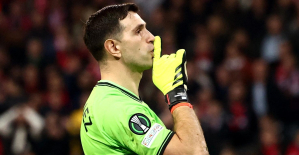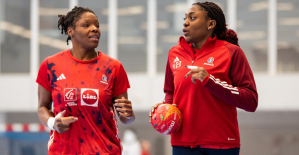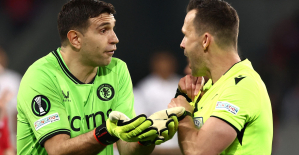The three Baltic heads of government came to Berlin to receive the Friedrich Hayek Prize together. The award is given to personalities who feel committed to freedom and the free market economy. After the ceremony in Berlin, Kaja Kallas from Estonia, Krisjanis Karins from Latvia and Ingrida Simonyte from Lithuania come to an interview with WELT in a simple meeting room. The question of who sits on which of the three chairs is routinely clarified by the Premiers. Practically speaking, whether geographically from north to south or alphabetically, the order is always the same: Estonia, Latvia, Lithuania.
WORLD: For many years, your states have warned Germany that it must change its security and energy policies. But no one listened to you. Has Germany understood you now?
Ingrida Simonyte: Yes, it has. We have always advised our German friends not to place too much trust in Moscow. Relations with Russia are never just about economic issues, but always geopolitical ones as well. Germany and its economy are now feeling the effects of this in a very practical way. We've known that for a long time.
Krisjanis Karins: In our countries we never believed that the German idea of “change through trade” could work. We were perhaps silently hoping that the concept would be successful. Unfortunately, we were right in the end, even if we're not happy about it.
WORLD: If Germany has understood, why are German politicians like the Saxon Prime Minister Michael Kretschmer calling for the war to be frozen and to negotiate with Russia?
Karins: I think such ideas are extremely problematic, downright dangerous for us Baltic states. We want the war to end. But that only works if Putin loses. If he gets even a part of what he wants, he takes that as a win and will keep going.
Kaja Kallas: It was a mistake not to punish Russia for its aggression in Georgia and Ukraine. Now we must not be soft again. The only solution is to push Russia back into its borders. So that Putin loses nothing, but also gains nothing. Anything else means the aggression has paid off for him. That would be an invitation, and no state could feel safe anymore. That is why we must help Ukraine to defend itself.
WORLD: Your country, Ms. Kallas, is helping Ukraine particularly intensively and is supplying the most weapons per inhabitant. Germany has been struggling with this for months. Does Berlin have to do more?
Kallas: I think we all need to do more.
WORLD: But Germany has been very hesitant in recent months when it comes to arms deliveries.
Kallas: We are 27 democracies in the EU. Smaller ships can change course faster than larger ones. Germany is a very big ship. It is important that decisions are made and implemented as quickly as possible.
Simonyte: It wouldn't be fair to just pick Germany either. There were many other large countries that had long refused to supply arms.
WORLD: Are you thinking of France?
Simonyte: We won't point fingers at countries. I would put it the other way around: It was a rather small group of countries that dared to deliver arms to Kyiv very early on. So even before the Russian invasion.
Karins: Besides, Germany acted very quickly. Chancellor Olaf Scholz said in his "Zeitenwende" speech in the Bundestag that I don't remember the exact date...
Called: … am 27. Februar…
Karins: Yes, exactly, thank you. So, three days after the Ukraine invasion, the Federal Chancellor announced that he would be upgrading the German army and supplying arms to Ukraine. Germany is a country with 70 years of pacifist tradition. This is a revolutionary shift in thinking.
WORLD: Or just in rhetoric...
Karins: Also in action. The decision was made very quickly to provide the Bundeswehr with 100 billion euros and to deliver weapons directly to Ukraine.
WORLD: What has been very tough since then...
Simonyte: Well, there were these philosophical debates about whether to supply light or heavy weapons. But gradually that changed. We have feared such a war for twenty years. It was easier for us to act quickly. Those countries that had long entertained illusions about Russia first had to wake up.
Kallas: For many, it was a very abrupt awakening. I remember when we came together immediately for the EU crisis summit on February 24th. This came as a real shock to some of the leaders of large countries. They couldn't believe that something like this could happen in 2022.
WORLD: An awakening that now also led to Germany taking over a new NATO mission in your country, Ms. Simonyte, in Lithuania a few days ago. Is that enough?
Simonyte: We shouldn't just look at Lithuania or Germany here. The entire eastern flank from north to south needs better protection. We decided that at the NATO summit in Madrid – and are gradually implementing it. The new German soldiers in Lithuania are part of this strategy.
Kallas: Yes, you have to see the big picture. In his most recent speech in Prague, Chancellor Scholz said that the two percent of gross domestic product that the country intends to spend annually on defense from now on will also go towards building up an air defense system. Germany's air defense against Russia, however, begins in the Baltic States. I think that's a fundamentally new attitude. We no longer talk about individual countries, but about the entire region, and act together.
Karins: In the past, not everyone even agreed whether there was a threat. We said yes, others said no. We often had the feeling that our arguments were not being listened to. That has completely changed. The atmosphere at the EU table, at the NATO table, is completely different.
WORLD: You say that your arguments are now being heard. Does that also apply to the visa freeze for Russian citizens that you are calling for? There is no EU-wide decision on this, Germany, for example, is against it.
Karins: It just takes a while. On February 24th we met in the council, Selenskyj was connected. He didn't even know if he would still be alive the next day. Many in Brussels thought that Kyiv will fall in two or three days. In the evening we discussed how we can react. It was clear to everyone that sanctions were needed. But we couldn't even agree to put Putin and Lavrov on a sanctions list. Three days later, Olaf Scholz spoke of a "turning point" and a lot became possible. A lot has changed since then.
Kallas: It takes time. We are often the first to suggest something, the others follow suit. The most important thing is our European unity, which must be preserved. Because of this, some decisions are not made immediately.
Simonyte: When we agreed to block European airspace for Russian planes, very few were aware that Russians would now increasingly be coming over our borders. The citizens of our countries wonder why they see all these Russians here on vacation, shopping, while at the same time Russians are killing people in Ukraine.
Kallas: And Ukrainian refugees…
Simonyte: … who, for example, work in a hotel and have to hear horrible things from Russian guests. That is not right. We know that people in Belarus and Russia are also being persecuted. They can come to us. We know who needs protection and who doesn't.
WORLD: Ms. Kallas, Russia has just completely stopped the gas transfer through Nord Stream 1...
Kallas: Surprise, surprise…
WORLD: German politicians have proposed opening Nord Stream 2. What do you make of it?
Kallas: Do I have to answer that seriously?
WORLD: There is such a debate in Germany.
Callas: All right. The pipelines were never just an economic project, but a geopolitical tool of Russia. Russia wants the sanctions lifted so it can continue its war of aggression undisturbed. When it was said in the spring that the EU could not end gas imports because that would damage the German economy in particular, Moscow listened carefully. Russia knows that Germany is vulnerable. Opening Nord Stream 2 would not change that. Germany would yield to Russia. That would be dangerous for all of us.
Simonyte: Does anyone really believe that there are technical problems with Nord Stream 1? There is also the Yamal pipeline, which runs overland and which Russia could use. I don't understand this talk.
Kallas: At the same time, Russia is burning gas near the Finnish border.
Karins: We Balts have already argued against the construction of Nord Stream 1 and pointed out to Germany how dangerous it is to become so dependent on a single supplier. Then there is Russia, which uses its energy industry as a means of blackmail. In Berlin, however, it was decided to continue with the project. Nord Stream 2 has made a bad situation even worse. And again they didn't listen to us. But the mistakes of the past have happened. It is important that we act now to get out of this situation. I see that Germany is looking for ways. I am confident. The energy crisis will be a problem this winter, maybe next. Then no more. But the fact that some say you have to give in to the blackmailer is extremely dangerous.
WORLD: But couldn't one winter be too much? Won't support for Ukraine end when the people of Europe feel the energy crisis firsthand?
Kallas: In my country we have 25 percent inflation. That's a war tax, that's how I see it. We pay them in euros, the Ukrainians in lives. You in Germany have better neighbors than we do in Estonia. I understand that it is more difficult to explain to Germans the need for current politics. But that is precisely our duty. We need to explain to people why it is necessary to help Ukraine. So that Russia will be pushed back and this war will end.

 Sydney: Assyrian bishop stabbed, conservative TikToker outspoken on Islam
Sydney: Assyrian bishop stabbed, conservative TikToker outspoken on Islam Torrential rains in Dubai: “The event is so intense that we cannot find analogues in our databases”
Torrential rains in Dubai: “The event is so intense that we cannot find analogues in our databases” Rishi Sunak wants a tobacco-free UK
Rishi Sunak wants a tobacco-free UK In Africa, the number of millionaires will boom over the next ten years
In Africa, the number of millionaires will boom over the next ten years WHO concerned about spread of H5N1 avian flu to new species, including humans
WHO concerned about spread of H5N1 avian flu to new species, including humans New generation mosquito nets prove much more effective against malaria
New generation mosquito nets prove much more effective against malaria Covid-19: everything you need to know about the new vaccination campaign which is starting
Covid-19: everything you need to know about the new vaccination campaign which is starting The best laptops of the moment boast artificial intelligence
The best laptops of the moment boast artificial intelligence Bitcoin halving: what will the planned reduction in emissions from the queen of cryptos change?
Bitcoin halving: what will the planned reduction in emissions from the queen of cryptos change? The Flink home shopping delivery platform will be liquidated in France
The Flink home shopping delivery platform will be liquidated in France Bercy threatens to veto the sale of Biogaran (Servier) to an Indian industrialist
Bercy threatens to veto the sale of Biogaran (Servier) to an Indian industrialist Switch or signaling breakdown, operating incident or catenaries... Do you speak the language of RATP and SNCF?
Switch or signaling breakdown, operating incident or catenaries... Do you speak the language of RATP and SNCF? The main facade of the old Copenhagen Stock Exchange collapsed, two days after the fire started
The main facade of the old Copenhagen Stock Exchange collapsed, two days after the fire started Alain Delon decorated by Ukraine for his support in the conflict against Russia
Alain Delon decorated by Ukraine for his support in the conflict against Russia Who’s Who launches the first edition of its literary prize
Who’s Who launches the first edition of its literary prize Sylvain Amic appointed to the Musée d’Orsay to replace Christophe Leribault
Sylvain Amic appointed to the Musée d’Orsay to replace Christophe Leribault Skoda Kodiaq 2024: a 'beast' plug-in hybrid SUV
Skoda Kodiaq 2024: a 'beast' plug-in hybrid SUV Tesla launches a new Model Y with 600 km of autonomy at a "more accessible price"
Tesla launches a new Model Y with 600 km of autonomy at a "more accessible price" The 10 best-selling cars in March 2024 in Spain: sales fall due to Easter
The 10 best-selling cars in March 2024 in Spain: sales fall due to Easter A private jet company buys more than 100 flying cars
A private jet company buys more than 100 flying cars This is how housing prices have changed in Spain in the last decade
This is how housing prices have changed in Spain in the last decade The home mortgage firm drops 10% in January and interest soars to 3.46%
The home mortgage firm drops 10% in January and interest soars to 3.46% The jewel of the Rocío de Nagüeles urbanization: a dream villa in Marbella
The jewel of the Rocío de Nagüeles urbanization: a dream villa in Marbella Rental prices grow by 7.3% in February: where does it go up and where does it go down?
Rental prices grow by 7.3% in February: where does it go up and where does it go down? With the promise of a “real burst of authority”, Gabriel Attal provokes the ire of the opposition
With the promise of a “real burst of authority”, Gabriel Attal provokes the ire of the opposition Europeans: the schedule of debates to follow between now and June 9
Europeans: the schedule of debates to follow between now and June 9 Europeans: “In France, there is a left and there is a right,” assures Bellamy
Europeans: “In France, there is a left and there is a right,” assures Bellamy During the night of the economy, the right points out the budgetary flaws of the macronie
During the night of the economy, the right points out the budgetary flaws of the macronie These French cities that will boycott the World Cup in Qatar
These French cities that will boycott the World Cup in Qatar Europa Conference League: the semi-final flies to Lille, which loses to the wire against Aston Villa
Europa Conference League: the semi-final flies to Lille, which loses to the wire against Aston Villa Lille-Aston Villa: Cash disgusts Lille, the arbitration too... The tops and the flops
Lille-Aston Villa: Cash disgusts Lille, the arbitration too... The tops and the flops Handball: Les Bleues in the same group as Spain at Euro 2024
Handball: Les Bleues in the same group as Spain at Euro 2024 Europa Conference League: for Létang, Martinez “does not have the attitude of a high-level athlete”
Europa Conference League: for Létang, Martinez “does not have the attitude of a high-level athlete”


















